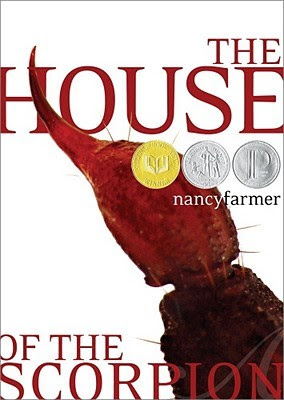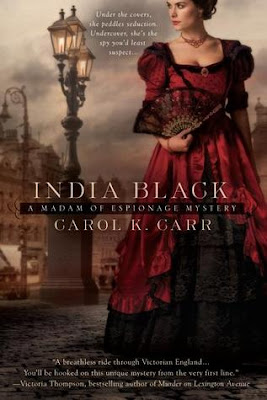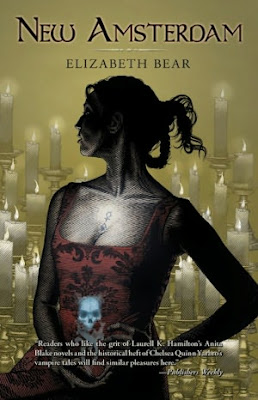Anyway:
Tor Teen was kind enough to send me a physical ARC of Renegade (The Elysium Chronicles #1) by J.A. Souders
Since the age of three, sixteen-year-old Evelyn Winters has been trained to be Daughter of the People in the underwater utopia known as Elysium. Selected from hundreds of children for her ideal genes, all her life she’s thought that everything was perfect; her world. Her people. The Law.
But when Gavin Hunter, a Surface Dweller, accidentally stumbles into their secluded little world, she’s forced to come to a startling realization: everything she knows is a lie. Her memories have been altered. Her mind and body aren’t under her own control. And the person she knows as Mother is a monster.
Together with Gavin she plans her escape, only to learn that her own mind is a ticking time bomb... and Mother has one last secret that will destroy them all.
I bought Blackberry Winter by Sarah Jio - I got the Nookbook because it was the Daily Find for $2.99
Seattle, 1933. Vera Ray kisses her three-year-old son, Daniel, goodnight and reluctantly leaves for work. She hates the night-shift, but it’s the only way she can earn enough to keep destitution at bay. In the morning—even though it’s the second of May—a heavy snow is falling. Vera rushes to wake Daniel, but his bed is empty. His teddy bear lies outside in the snow.
Seattle, present day. On the second of May, Seattle Times reporter, Claire Aldridge, awakens to another late-season snowstorm. Assigned to cover this “blackberry winter” and its predecessor decades earlier, Claire learns of Daniel’s unsolved abduction and vows to unearth the truth—only to discover that she and Vera are linked in unexpected ways.
and Better World Books was having a 50% off if you buy five sale.... so, naturally, I bought 8 books.
Tender Morsels is a dark and vivid story, set in two worlds and worrying at the border between them. Liga lives modestly in her own personal heaven, a world given to her in exchange for her earthly life. Her two daughters grow up in this soft place, protected from the violence that once harmed their mother. But the real world cannot be denied forever—magicked men and wild bears break down the borders of Liga’s refuge. Now, having known Heaven, how will these three women survive in a world where beauty and brutality lie side by side?
Welcome to 66 Star Street . . . In the top-floor flat lives music exec Katie. She spends her days fighting off has-been rock stars and wondering how much cheesecake you'd need to eat yourself to death. Below her, a pair of muscular Poles share with a streetwise cabbie named Lydia, who has a sharp tongue, an even sharper brain but some unexpected soft spots. On the first floor is Fionn - a gardener who prefers the company of parsnips to people. But he looks like a fairy-tale prince and when he's offered his own television show, he's suddenly thrust into the limelight. And at the bottom of the house live Matt and Maeve, who are Very Much In Love and who stave off despair by doing random acts of kindness. But a mysterious visitor has just landed at 66 Star Street, bringing love, friendship and heartbreak, and a new-found optimism. Old secrets are working their way to the surface and all their lives are about to change in the most unexpected of ways . . .
High in his attic bedroom, twelve-year-old David mourns the death of his mother, with only the books on his shelf for company. But those books have begun to whisper to him in the darkness. Angry and alone, he takes refuge in his imagination and soon finds that reality and fantasy have begun to meld. While his family falls apart around him, David is violently propelled into a world that is a strange reflection of his own -- populated by heroes and monsters and ruled by a faded king who keeps his secrets in a mysterious book, The Book of Lost Things.
Taking readers on a vivid journey through the loss of innocence into adulthood and beyond, New York Times bestselling author John Connolly tells a dark and compelling tale that reminds us of the enduring power of stories in our lives.
At his coming-of-age party, Matteo Alacrán asks El Patrón's bodyguard, "How old am I? ... I know I don't have a birthday like humans, but I was born."
"You were harvested," Tam Lin reminds him. "You were grown in that poor cow for nine months and then you were cut out of her."
To most people around him, Matt is not a boy, but a beast. But for El Patrón, lord of a country called Opium--a strip of poppy field lying between the U.S. and what was once called Mexico--Matt is a guarantee of eternal life. El Patrón loves Matt as he loves himself, for Matt is himself. They share identical DNA.
As Matt struggles to understand his existence, he is threatened by a sinister, grasping cast of characters, including El Patrón's power-hungry family. He is surrounded by a dangerous army of bodyguards and by the mindless slaves of Opium, brain-deadened 'eejits' who toil in the poppy fields.
Escape from the Alacrán Estate is no guarantee of freedom because Matt is marked by his difference in ways he doesn't even suspect. Around every turn in this vivid, futuristic adventure is a new, heart-stopping surprise.
A College of Magics (A College of Magics #1) by Caroline Stevermere
Teenager Faris Nallaneen is the heir to the small northern dukedom of Galazon. Too young still to claim her title, her despotic Uncle Brinker has ruled in her place. Now he demands she be sent to Greenlaw College. For her benefit he insists. To keep me out of the way, more like it!
But Greenlaw is not just any school-as Faris and her new best friend Jane discover. At Greenlaw students major in . . . magic.
But it's not all fun and games. When Faris makes an enemy of classmate Menary of Aravill, life could get downright . . . deadly.
Daughter of the Empire (The Empire Trilogy #1) by Raymond E. Feist and Janny Wurts
Magic and murder engulf the realm of Kelewan. Fierce warlords ignite a bitter blood feud to enslave the empire of Tsuranuanni. While in the opulent Imperial courts, assassins and spymasters plot cunning and devious intrigues against the rightful heir.
Now Mara, a young, untested Ruling Lady, is called upon to lead her people in a heroic struggle for survival. But first she must rally an army of rebel warriors, form a pact with the alien cho-ja, and marry the son of a hated enemy. Only then can Mara face her most dangerous foe of all -- in his own impregnable stronghold.
Curse of the Mistwraith (Wars of Light and Shadow #1) by Janny Wurts
The world of Athera lives in eternal fog, its skies obscured by the malevolent Mistwraith. Only the combined powers of two half-brothers can challenge the Mistwraith's stranglehold: Arithon, Master of Shadow, and Lysaer, Lord of Light. Arithon and Lysaer soon find that they are inescapably bound to a series of events dictated by their own deepest convictions.
Yet as the sorcerers of the Fellowship of Seven know well, there is more at stake than one battle with the Mistwraith: between them the half-brothers hold the balance of the world—its harmony and its future—in their hands.
The Ships of Merior (The Wars of Light and Shadow #2) by Janny Wurts
Janny Wurts’s epic tale of two half-brothers cursed to life-long enmity continues in this spectacular second volume, now re-released with a striking new cover. The half-brothers Arithon, Master of Shadow, and Lysaer, Lord of Light, have defeated the Mistwraith and dispersed the fogs that smothered Athera’s skies.
But their victory comes at a high price: the Mistwraith has set them at odds under a powerful curse of vengeance. The two princes are locked in deadly enmity, with the fates of nations and the balance of the world’s mystical powers entangled in their feud. Arithon, forced out of hiding, finds himself hounded by Lysaer and his mighty army. He must take to his natural element – the seas – in order to evade pursuit and steal the initiative. However, his efforts are impeded by outside magical factions, not to mention a drunken prophet sent to safeguard his life, but who seems determined to wreck his cause by misadventure.
Did you buy any new books this week? I seem to be in a fantasy kind of mood, so a lot of my buys were in that genre. It's been a while since I've dived head first into my favorite genre, so I am looking forward to my reads!































